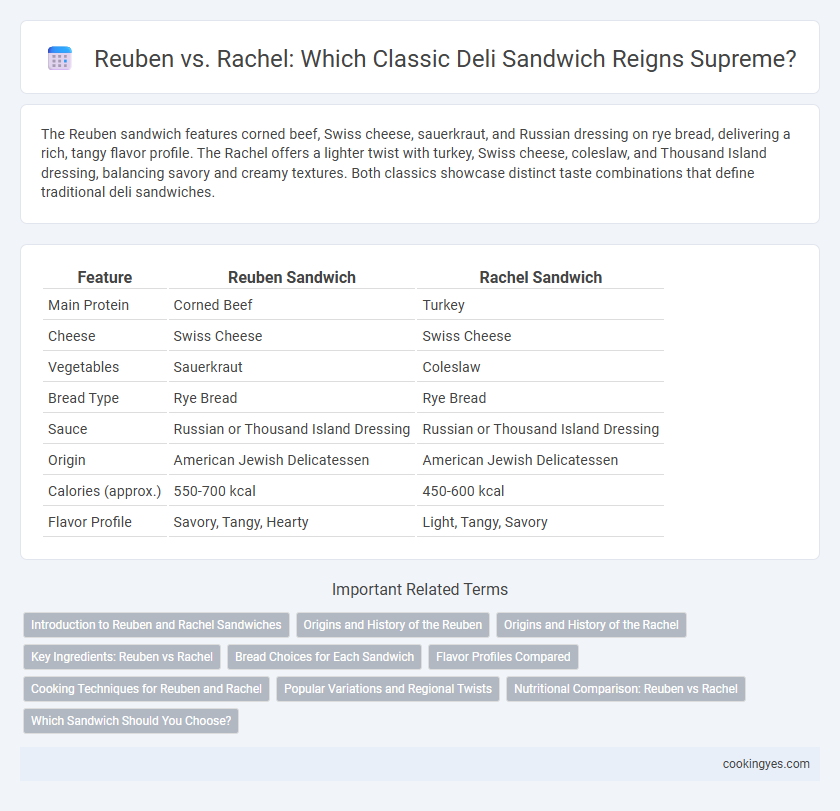The Reuben sandwich features corned beef, Swiss cheese, sauerkraut, and Russian dressing on rye bread, delivering a rich, tangy flavor profile. The Rachel offers a lighter twist with turkey, Swiss cheese, coleslaw, and Thousand Island dressing, balancing savory and creamy textures. Both classics showcase distinct taste combinations that define traditional deli sandwiches.
Table of Comparison
| Feature | Reuben Sandwich | Rachel Sandwich |
|---|---|---|
| Main Protein | Corned Beef | Turkey |
| Cheese | Swiss Cheese | Swiss Cheese |
| Vegetables | Sauerkraut | Coleslaw |
| Bread Type | Rye Bread | Rye Bread |
| Sauce | Russian or Thousand Island Dressing | Russian or Thousand Island Dressing |
| Origin | American Jewish Delicatessen | American Jewish Delicatessen |
| Calories (approx.) | 550-700 kcal | 450-600 kcal |
| Flavor Profile | Savory, Tangy, Hearty | Light, Tangy, Savory |
Introduction to Reuben and Rachel Sandwiches
The Reuben sandwich features corned beef, Swiss cheese, sauerkraut, and Russian dressing on rye bread, creating a classic deli flavor profile. The Rachel sandwich substitutes turkey or pastrami for corned beef and coleslaw for sauerkraut, offering a lighter, tangier alternative. Both sandwiches remain staples in delis, celebrated for their distinct combinations of cured meats and flavorful toppings.
Origins and History of the Reuben
The Reuben sandwich originated in the early 20th century, credited to either Omaha's Blackstone Hotel or a New York deli, reflecting its Jewish-American culinary roots. Traditionally, the Reuben features corned beef, Swiss cheese, sauerkraut, and Russian dressing on rye bread, symbolizing Eastern European immigrant influences. Its creation highlights a fusion of savory flavors and ingredients that have become iconic in classic deli sandwiches.
Origins and History of the Rachel
The Rachel sandwich, a classic deli favorite, originated as a variation of the Reuben in the early 1960s, credited to Jewish delicatessens seeking a lighter alternative by substituting pastrami or turkey for corned beef and coleslaw for sauerkraut. Its creation reflects a culinary adaptation within American Jewish communities, emphasizing leaner meats while maintaining the essential rye bread and Russian dressing combination. This sandwich's history highlights the evolution of deli culture in the United States, showcasing regional preferences and ingredient innovations that distinguish the Rachel from its iconic predecessor, the Reuben.
Key Ingredients: Reuben vs Rachel
The key ingredients that distinguish the Reuben from the Rachel sandwich are corned beef and pastrami, respectively, both layered on rye bread with Swiss cheese, sauerkraut, and Russian dressing. The Reuben features tender, cured corned beef, while the Rachel highlights leaner, smoky pastrami, creating different flavor profiles. Sauerkraut in the Reuben contrasts with coleslaw often used in the Rachel, enhancing the texture and taste unique to each classic deli favorite.
Bread Choices for Each Sandwich
The Reuben sandwich traditionally features slices of rye bread, prized for its robust flavor and slightly chewy texture that holds up to corned beef, sauerkraut, Swiss cheese, and Russian dressing. In contrast, the Rachel sandwich typically uses marbled rye or light rye bread, which complements its leaner fillings of turkey, coleslaw, and Swiss cheese without overpowering the milder flavors. Bread choice plays a crucial role in balancing the sandwich's texture and taste profile, with rye varieties enhancing the savory elements distinctive to classic deli sandwiches.
Flavor Profiles Compared
The Reuben sandwich features a rich and savory combination of corned beef, Swiss cheese, sauerkraut, and Russian dressing on rye bread, offering a bold, tangy, and creamy flavor profile. The Rachel sandwich substitutes turkey for corned beef and uses coleslaw instead of sauerkraut, resulting in a lighter, slightly sweet, and crisp taste with a smoky undertone from the turkey. Both sandwiches balance creamy dressing and hearty bread but differ primarily in meat choice and the acidity of their vegetable components, defining their distinctive flavor experiences.
Cooking Techniques for Reuben and Rachel
The Reuben sandwich features corned beef, Swiss cheese, sauerkraut, and Russian dressing grilled on rye bread, utilizing a grilling technique that melts the cheese and crisps the bread to perfection. In contrast, the Rachel sandwich replaces corned beef with turkey and sauerkraut with coleslaw, often toasted rather than grilled. The difference in cooking methods enhances the Reuben's rich, smoky flavor while the Rachel offers a lighter, tangier profile through its toasting process and alternative fillings.
Popular Variations and Regional Twists
The Reuben sandwich, featuring corned beef, Swiss cheese, sauerkraut, and Russian dressing on rye bread, is a staple in New York delis and thrives in the Midwest with variations like the addition of pastrami. The Rachel sandwich swaps corned beef for lean turkey and replaces sauerkraut with coleslaw, often paired with Thousand Island dressing, highlighting its lighter regional twist popular on the West Coast. Both sandwiches showcase the versatility of deli meats and condiments, adapting to local tastes and ingredient availability across the United States.
Nutritional Comparison: Reuben vs Rachel
The Reuben sandwich, typically made with corned beef, Swiss cheese, sauerkraut, and Russian dressing on rye bread, tends to be higher in calories, saturated fat, and sodium compared to the Rachel sandwich, which substitutes corned beef with lean turkey and often swaps sauerkraut for coleslaw. Nutritional analysis shows the Rachel sandwich offers a lighter alternative, with fewer calories and less sodium, making it a better choice for those managing heart health or calorie intake. Both sandwiches provide protein and essential nutrients but vary significantly in fat content and overall calorie density due to their differing meat and condiment compositions.
Which Sandwich Should You Choose?
The Reuben sandwich, featuring corned beef, Swiss cheese, sauerkraut, and Russian dressing on rye bread, offers a rich, tangy flavor profile ideal for those craving a hearty, traditional deli experience. The Rachel sandwich substitutes turkey for corned beef and coleslaw for sauerkraut, creating a lighter, slightly sweeter option with a similar savory punch. Choosing between a Reuben and a Rachel depends on your preference for either a robust, beef-based sandwich or a leaner, turkey-centered alternative without sacrificing classic deli taste.
Reuben vs Rachel for classic deli sandwiches Infographic

 cookingyes.com
cookingyes.com